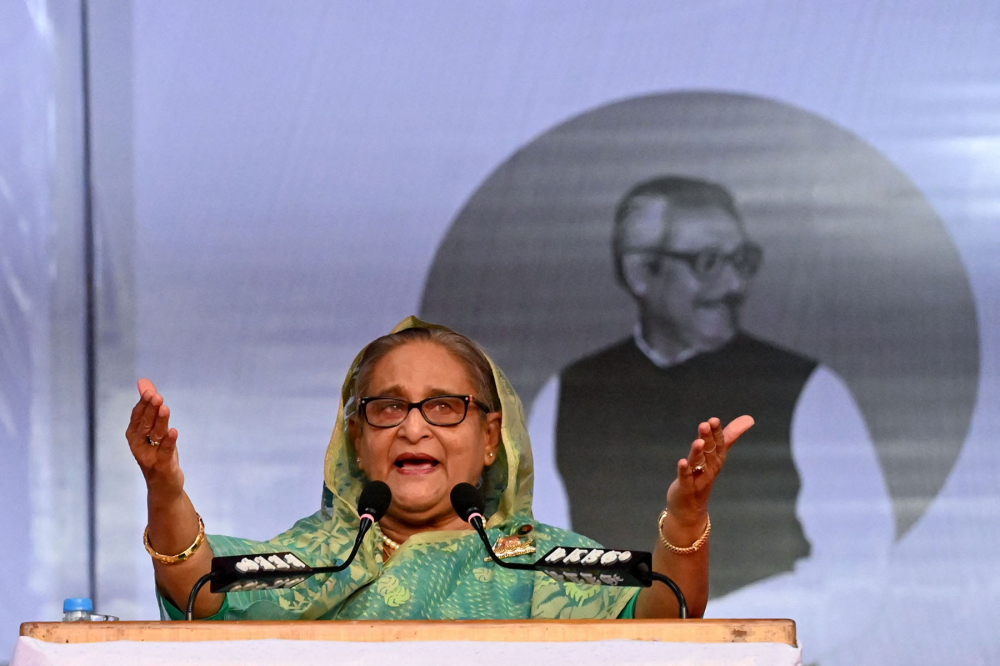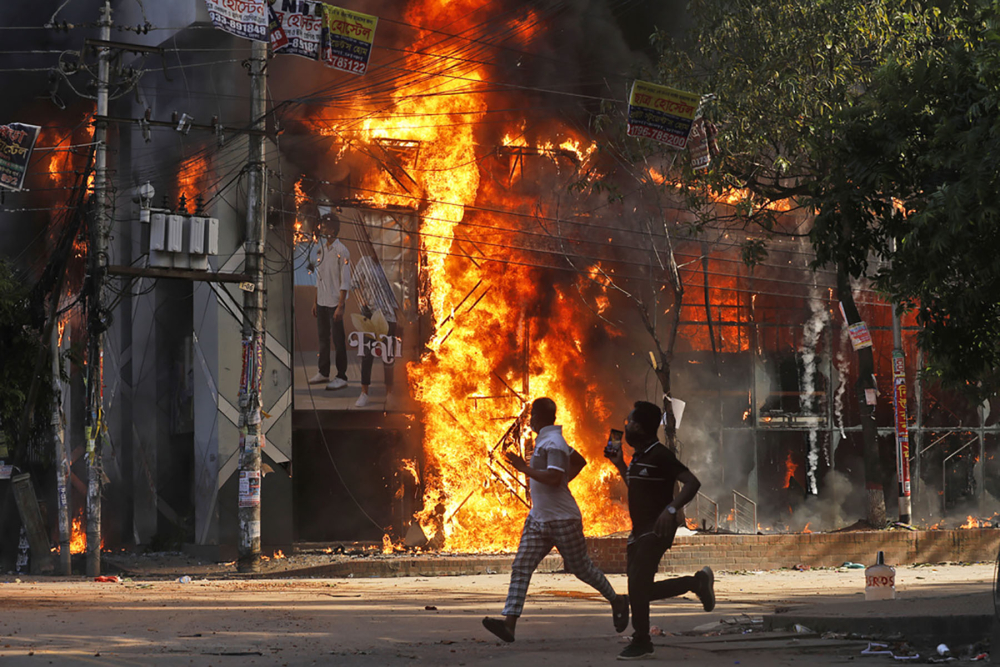The fighter of democracy, the empress of despotism

We use Google Cloud Translation Services. Google requires we provide the following disclaimer relating to use of this service:
This service may contain translations powered by Google. Google disclaims all warranties related to the translations, expressed or implied, including any warranties of accuracy, reliability, and any implied warranties of merchantability, fitness for a particular purpose, and noninfringement.

Highlights
- Hasina's supporters claim that Bangladesh has achieved great economic prosperity under her leadership and that she has brought much-needed political stability to the country. But the opponents have been accusing him of prolonging his rule in a dictatorial style lately.



Sheikh Hasina is the daughter of Bangladesh's independence hero Sheikh Mujibar Rahman and the leader of the Awami League. Bangladesh, then East Pakistan, became independent in 1971 under the leadership of Rahman. Rahman, the first president of South Asia's youngest nation, is also known as Bangabandhu (Friend of Bengal).

Rahman was killed in Sainik Ku in 1975. While Hasina and her sister Rehna, who were on a European tour, survived, several other family members were killed. The sisters took refuge in the Bangladesh embassy in the UK for some time. Later, she returned to Sweden as the party chief in 1981 after being in exile in India for about 6 years at the invitation of Indian Prime Minister Indira Gandhi. In 1990, the military ruler Hussain Mohammad Ersad was replaced by his rebellion against the military rule along with Begum Khaleda Zia.
Khaleda Zia ruled the government for five years from 1991 through general elections after the establishment of democracy. However, in 1996, Hasina became the Prime Minister for the first time. She was defeated in 2001, leaving Khaleda Zia as prime minister until 2006. Meanwhile, after the relationship between the two leaders deteriorated, the competition went towards revenge.
The political enmity between the two leaders turned into violence and clashes, and the army took over power after the elections failed to take place. Later, Army Chief General Mohin Uddin Ahmed appointed Economist Fakhruddin Ahmed as Chief Advisor to lead the caretaker government. Hasina, who became the prime minister after the Awami League won the elections held on December 29, 2008, has been in power continuously since then.
 Hasina was elected Prime Minister for the fifth term in the elections held in January without opposition. She became the prime minister for the first time in 1996 and won all four elections since 2008. She was the longest serving female leader before leaving the country. Bangladesh's main opposition party, the Bangladesh Nationalist Party (BNP), boycotted the last election, which was highly controversial. The Hasina-led government had arrested thousands of BNP activists and their opponents and critics before the elections. In the election for 300 seats, his party Awami League won 224, while the rest of the seats were also won by the 'proxy' candidates raised in the name of the opposition.
Hasina was elected Prime Minister for the fifth term in the elections held in January without opposition. She became the prime minister for the first time in 1996 and won all four elections since 2008. She was the longest serving female leader before leaving the country. Bangladesh's main opposition party, the Bangladesh Nationalist Party (BNP), boycotted the last election, which was highly controversial. The Hasina-led government had arrested thousands of BNP activists and their opponents and critics before the elections. In the election for 300 seats, his party Awami League won 224, while the rest of the seats were also won by the 'proxy' candidates raised in the name of the opposition.
Recently, Hasina, who ran an anti-democratic regime, took vindictive action against critics, journalists and civil society leaders, this nature became the cause of her downfall. Nobel Peace Prize winner Mohammad Yunus was jailed for six months by the Hasina-led government, accused of violating labor laws.
Before that, journalist and famous photographer Sahidul Alam was also detained. In an interview with Al Jazeera television, Alam accused the Hasina administration of stifling human rights and freedom of expression. He was also accused of spreading confusion and violence against the state. The repression of Yunus and Alam tarnished the international image of the Hasina regime.
 Bangladesh's deepening unemployment problem is also the cause of Hasina's demise. According to a statistic, 40 percent of the citizens of Bangladesh between the ages of 15 and 24 are illiterate and unemployed. Polimal, a diplomatic correspondent of Bangladesh's leading media The Dailystar, told Kantipur on the telephone, "The students' movement is intensifying and on the surface, the issue of reservation is visible, reservation has only done a trickle job. Citizens were suffering from years of corruption, election rigging and unemployment. Hasina's supporters claim that under her leadership, Bangladesh has achieved great economic prosperity and that she has maintained the much-needed political stability in the country. But the opponents have been accusing him of prolonging his rule in a dictatorial style lately.
Bangladesh's deepening unemployment problem is also the cause of Hasina's demise. According to a statistic, 40 percent of the citizens of Bangladesh between the ages of 15 and 24 are illiterate and unemployed. Polimal, a diplomatic correspondent of Bangladesh's leading media The Dailystar, told Kantipur on the telephone, "The students' movement is intensifying and on the surface, the issue of reservation is visible, reservation has only done a trickle job. Citizens were suffering from years of corruption, election rigging and unemployment. Hasina's supporters claim that under her leadership, Bangladesh has achieved great economic prosperity and that she has maintained the much-needed political stability in the country. But the opponents have been accusing him of prolonging his rule in a dictatorial style lately.
Before and after last January's elections, the opponents raised their voices against Hasina saying that she ran an autocratic regime. On top of that, the voice of the opposition was not heard much because countries including neighboring India supported Hasina's authoritarian style 'with a blind eye'. But the steps taken to suppress the student movement in the past few weeks have become heavy for him.
There is a sudden break in the political future of Sheikh Hasina, who has been concentrating power. Son Sajeev Wajed has said that his mother's "political comeback is now impossible". Wajed, who is also Hasina's adviser, told BBC that Hasina, who had been thinking of resigning since Sunday, left the country for safety after her family's request.
 प्रकाशित : श्रावण २२, २०८१ ०५:१४
प्रकाशित : श्रावण २२, २०८१ ०५:१४

 ३०.१२°C काठमाडौं
३०.१२°C काठमाडौं













